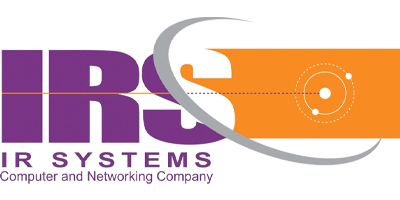Why Enterprises Choose Quorum for Data Protection IR Systems

In today’s digital age, enterprises are generating and handling unprecedented volumes of data. From customer information and financial records to intellectual property, corporate data has become one of the most valuable assets of any organization. With the rising threats of cyberattacks, ransomware, and system failures, protecting this data is no longer optional – it’s critical. This is where Quorum, offered by IR Systems, steps in as a comprehensive enterprise data protection solution that ensures security, reliability, and seamless accessibility. The Importance of Enterprise Data Protection Data is the backbone of modern enterprises. Losing it due to cyberattacks, accidental deletion, or hardware failure can result in catastrophic consequences, including financial losses, reputational damage, and regulatory penalties. According to recent industry reports, the average cost of a data breach for enterprises is in the millions, making robust data protection strategies indispensable. Enterprise data protection goes beyond simple backups. It encompasses data security, backup and recovery solutions, ransomware protection, and storage management – all designed to keep your organization’s information safe while ensuring business continuity. With Quorum by IR Systems, enterprises can confidently safeguard their most critical assets while focusing on growth and innovation. What Makes Quorum Stand Out? Quorum stands out by offering enterprise-grade data protection with seamless backup, advanced ransomware security, and scalable storage solutions: 1. Comprehensive Backup and Recovery Solutions A reliable backup system is the cornerstone of any data protection strategy. Quorum offers enterprise-grade backup and recovery solutions that ensure your data is safe, secure, and easily recoverable. Whether your organization needs on-site backups, offsite disaster recovery, or cloud-based solutions, Quorum covers all bases. IR Systems ensures that every deployment of Quorum is tailored to your enterprise’s unique needs, minimizing downtime and maximizing reliability. In the event of data loss, Quorum allows you to restore information quickly, reducing operational disruptions and protecting your business continuity. 2. Advanced Ransomware Protection Ransomware attacks are becoming increasingly sophisticated, targeting enterprises of all sizes. Quorum’s enterprise ransomware protection features proactive monitoring, threat detection, and automated responses to suspicious activity. By combining real-time analytics with intelligent threat mitigation, Quorum ensures that your data remains secure, even in the face of evolving cyber threats. IR Systems integrates these advanced security measures into Quorum to offer best-in-class ransomware protection, safeguarding not just your data but also your enterprise’s reputation and compliance posture. 3. Enterprise Data Security at Its Core Security is a non-negotiable requirement for any enterprise. Quorum implements multi-layered security protocols, including encryption, access control, and data privacy measures, ensuring that sensitive information remains protected at all times. Whether it’s financial records, customer data, or proprietary research, Quorum provides peace of mind that your enterprise information is safe from unauthorized access. IR Systems goes beyond technology by offering consultative support, helping enterprises develop and implement data protection strategies that align with regulatory requirements and industry standards. 4. Seamless Enterprise Storage Solutions Data protection is closely tied to storage efficiency. Quorum provides enterprise storage solutions that integrate seamlessly with existing infrastructure. From SAN storage and hyper-converged systems to cloud-based repositories, Quorum ensures that your data is always available, properly organized, and easily scalable as your enterprise grows. With IR Systems’ expertise, enterprises can implement storage solutions that optimize performance, reduce costs, and simplify management, ensuring that data protection does not become a bottleneck to business operations. 5. Hyper-Converged Infrastructure Support Modern enterprises are increasingly turning to hyper-converged infrastructure (HCI) to simplify IT management and improve scalability. Quorum is fully compatible with HCI, providing integrated storage, backup, and security solutions in a single platform. This integration allows IT teams to manage their infrastructure efficiently while ensuring robust data protection across all virtualized and physical systems. IR Systems’ deployment of Quorum ensures that enterprises can leverage the full potential of HCI technology without compromising on data security or recovery capabilities. 6. Tailored Solutions for Every Enterprise One of the biggest challenges in enterprise data protection is that one size does not fit all. Every organization has unique storage needs, security requirements, and compliance obligations. Quorum, offered by IR Systems, is highly customizable to meet the specific demands of your enterprise. From small-to-medium businesses seeking reliable backup systems to large multinational corporations requiring complex storage, encryption, and ransomware protection, Quorum adapts to provide a scalable and effective data protection strategy for every enterprise scenario. Benefits of Choosing Quorum Enhanced Security: Protect sensitive enterprise data with multi-layered security measures and proactive ransomware defense. Reliable Backup: Ensure quick data recovery and minimal downtime during disasters. Scalable Storage: Expand storage capacity seamlessly with hyper-converged and cloud solutions. Regulatory Compliance: Align with industry standards and data protection regulations effortlessly. Expert Support: IR Systems provides expert guidance, consultation, and ongoing support to optimize your data protection strategy. By integrating Quorum into your enterprise IT environment, you are not just investing in a backup solution, but a comprehensive data protection ecosystem designed to keep your business secure, compliant, and operationally efficient. Why Enterprises Trust IR Systems IR Systems has a proven track record of helping enterprises implement cutting-edge data protection solutions. Their expertise in enterprise storage, backup, and hyper-converged infrastructure ensures that Quorum delivers maximum value to every client. Enterprises that choose Quorum through IR Systems benefit from: Tailored deployments for unique business needs Continuous monitoring and support to mitigate risks Optimized data management for better performance and cost efficiency With IR Systems as a partner, enterprises can confidently navigate the challenges of modern data protection, knowing that their critical information is secure and easily recoverable. Conclusion In an era where data is a critical enterprise asset, choosing the right protection solution is paramount. Quorum by IR Systems offers a comprehensive suite of features, including enterprise backup and recovery, ransomware protection, storage optimization, and hyper-converged infrastructure support. By choosing Quorum, enterprises gain not just a tool but a strategic partner in data protection and management, ensuring business continuity, compliance, and security in a constantly evolving digital landscape. For any enterprise serious about safeguarding its data, Quorum is the ultimate solution to protect, manage, and
Top SAN Storage Distributors in Pakistan with Secure Data
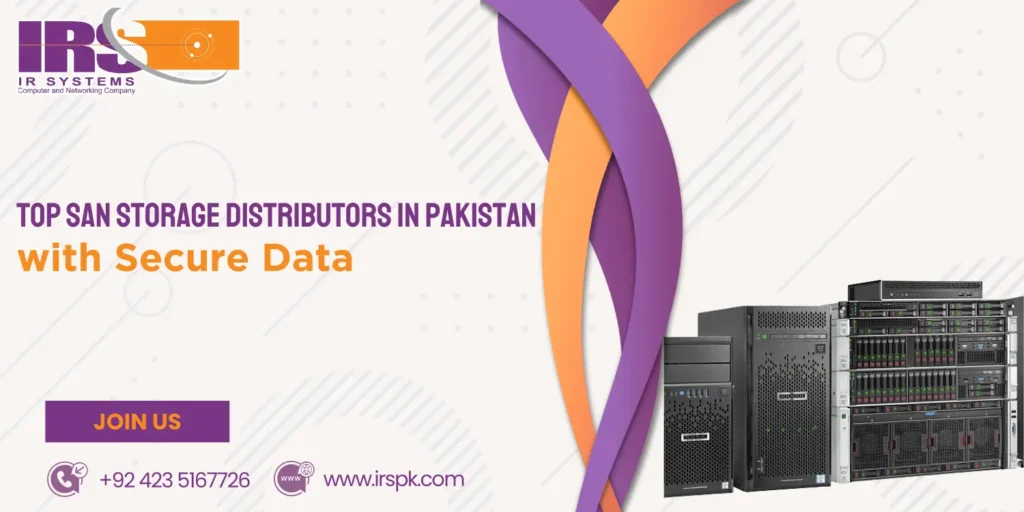
In today’s digital age, data has become the backbone of every business. From small startups to large enterprises, the need for reliable and secure data storage is greater than ever before. For companies in Pakistan, SAN storage solutions have emerged as the top choice to ensure scalability, high performance, and data security. If you are looking for SAN storage distributors in Pakistan, you’re in the right place. At IR Systems, we specialize in providing modern SAN storage solutions in Pakistan, tailored to meet the growing needs of businesses. In this blog, we’ll explore what SAN storage is, why it matters, who the top distributors are, and how it can transform your IT infrastructure. What is SAN Storage? SAN (Storage Area Network) is a high-speed, dedicated network that connects servers with storage devices. Unlike traditional storage methods, SAN storage offers a centralized, scalable, and highly secure way to manage data. Businesses that deal with large amounts of critical data rely on SAN for its speed, reliability, and performance. With the rise of all flash SAN in Pakistan, companies can now experience lightning-fast access to data, which is crucial for industries like banking, healthcare, and e-commerce. Why SAN Storage Solutions Matter for Businesses in Pakistan Choosing the right storage infrastructure isn’t just about saving data – it’s about ensuring that your organization runs smoothly with high-availability storage. Here’s why SAN storage solutions in Pakistan are becoming a must-have: Scalability – Businesses grow, and so does their data. SAN makes it easy to scale without major disruptions. Performance – With dedicated bandwidth, SAN delivers higher performance compared to traditional storage systems. Security – SAN ensures your data is not only stored but protected against potential threats. Disaster Recovery – With SAN, data can be backed up seamlessly, giving companies peace of mind during system failures. Centralized Management – It simplifies IT operations by managing all data in one place. At IR Systems, we understand these challenges and provide SAN storage solutions in Pakistan that guarantee long-term reliability. Top SAN Storage Distributors in Pakistan When it comes to finding SAN companies in Pakistan, businesses often look for trusted names that can deliver both hardware and expertise. Here are some of the leading distributors: 1. IR Systems (Our Expertise) As a leading provider of SAN storage solutions in Pakistan, IR Systems stands out for delivering secure, scalable, and high-performance storage infrastructure. We provide cutting-edge solutions, including all flash SAN in Pakistan, tailored for industries that demand uninterrupted data access. Our team goes beyond just supplying storage – we design, implement, and manage storage systems that help organizations achieve high-availability storage with minimal downtime. Plus, we offer value-added services such as free backup software to make data management more affordable for clients. 2. Dell EMC Distributors in Pakistan Dell EMC is a global name in storage, and their SAN solutions are widely used across industries in Pakistan. They are well known for their enterprise-grade storage and integration with virtualization platforms. 3. HPE (Hewlett Packard Enterprise) Partners HPE’s SAN storage products are designed for flexibility and performance. Their distributors in Pakistan work with businesses looking for hybrid storage solutions that combine both on-premise and cloud options. 4. Huawei Storage Solutions Huawei is another trusted brand, offering cost-effective SAN systems suitable for businesses in Pakistan that want high performance without breaking the bank. 5. NetApp Resellers in Pakistan NetApp provides powerful storage options, and their SAN systems are popular for enterprises that need data analytics and virtualization support. While many brands exist, the difference comes from working with a distributor who understands your needs. That’s where IR Systems makes the real impact. Why Choose IR Systems for SAN Storage in Pakistan? At IR Systems, we go beyond being just another name in the list of SAN storage distributors in Pakistan. Here’s why businesses trust us: Customized Solutions: Every business has unique storage requirements, and we provide tailor-made systems. Secure Data Management: We ensure your data is protected with the latest security protocols. High-Availability Storage: Our solutions are designed to keep your business running with zero downtime. All Flash SAN in Pakistan: We provide the latest flash-based storage for unmatched speed and efficiency. End-to-End Support: From planning and installation to maintenance, we’re with you every step of the way. Free Backup Software: As a value-add, we provide cost-effective backup solutions that keep your data safe. By choosing IR Systems, you’re not just buying storage – you’re investing in peace of mind. Benefits of SAN Storage for Different Industries in Pakistan SAN storage is not limited to IT companies. Its benefits extend across multiple industries: Healthcare – Secure patient records, quick access to medical histories, and compliance with data standards. Finance & Banking – Faster transactions, reliable backup, and top-notch security. Retail & E-Commerce – Manage growing databases, customer data, and transaction histories. Education – Centralized storage for research data, student records, and e-learning platforms. Manufacturing & Industry – Reliable storage for operations, monitoring, and supply chain data. Future of SAN Storage in Pakistan The future of data management in Pakistan is heading towards all flash SAN solutions. With faster speeds, better durability, and declining costs, flash-based SAN is becoming more accessible. Coupled with free backup software and advanced recovery tools, businesses can now ensure uninterrupted operations even in unexpected situations. At IR Systems, we’re committed to staying ahead of these trends, ensuring our clients have access to the latest SAN storage solutions in Pakistan. Conclusion In a world where data drives decisions, businesses cannot afford to compromise on storage. That’s why SAN storage solutions in Pakistan are quickly becoming the backbone of modern enterprises. With trusted SAN storage distributors in Pakistan like IR Systems, businesses can achieve secure, scalable, and high-performance storage that ensures long-term success. If you’re ready to take your business data to the next level, IR Systems is your trusted partner for SAN storage in Pakistan. Contact us today to explore our wide range of SAN storage solutions and discover how we can help secure
Top SAN Storage & Network Devices for Cloud Backup in 2025
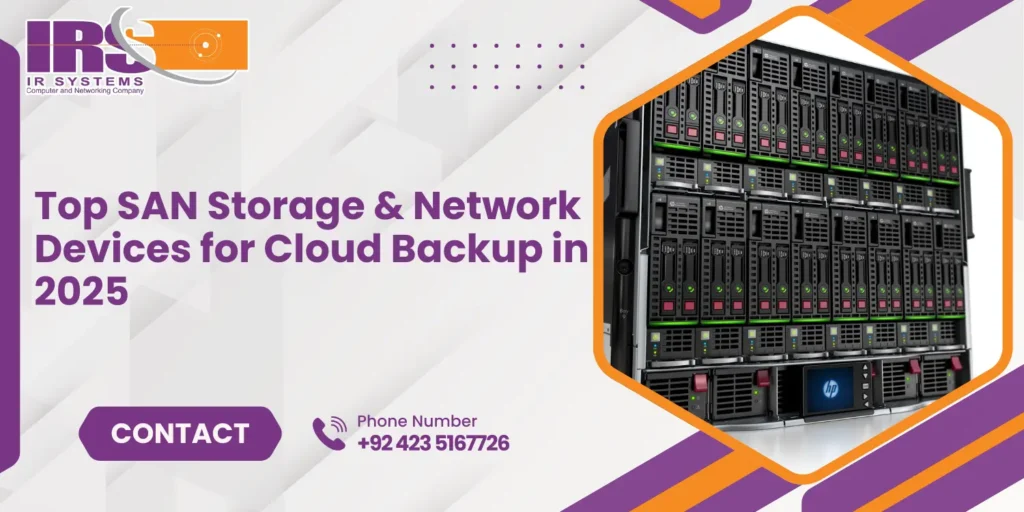
In the digital age, data is the backbone of every business. Whether you’re a startup or an established company, the need for secure, fast, and scalable data storage has never been greater. SAN storage (Storage Area Network) is rapidly becoming the go-to solution for businesses aiming to protect and manage their data efficiently. At IR Systems, we specialize in providing cutting-edge NAS storage and SAN storage solutions designed to meet the unique needs of modern businesses. In this blog, we’ll explore the best SAN storage and storage area network devices for server cloud backup, and how these solutions can transform your data management strategy. Why SAN Storage Matters? SAN storage is a high-performance, dedicated network that connects servers to storage devices. Unlike traditional storage methods, SAN provides block-level storage, ensuring faster data access and seamless data transfers. Key Advantages of SAN Storage: Blazing-Fast Data Speeds: Perfect for real-time data processing and backup. Centralized Storage: Manage all your data from a single point. High Scalability: Easily expand your storage capacity as your business grows. Robust Backup Support: SAN integrates effortlessly with cloud backup systems. Understanding Storage Area Network Devices When building a SAN storage system, the storage area network devices you choose make all the difference. These are the core components that power your SAN network. Essential SAN Devices: Disk Arrays: High-capacity storage units designed for speed and redundancy. Fibre Channel Switches: Enable rapid and reliable communication between servers and storage devices. Storage Controllers: Manage data flow, prevent bottlenecks, and ensure optimal performance. With the right mix of these devices, you can create a high-speed, reliable network perfect for server cloud backups. The Power of Server Cloud Backup A server cloud backup is essential for modern businesses. Unlike local backups that are vulnerable to system failures and physical damage, cloud backups offer safe, remote storage with real-time access. Benefits of Server Cloud Backup: Automatic Backups: Schedule backups to run without manual intervention. Remote Access: Retrieve your data from anywhere, anytime. Disaster Recovery: Quickly restore your systems in the event of data loss. Data Security: Cloud providers offer encryption and multiple layers of protection. By combining SAN storage with server cloud backup, you get the best of both worlds – lightning-fast local storage and safe, off-site data protection. Top SAN Storage Devices to Consider in 2025 Choosing the right storage solution is critical. Here are some top SAN storage devices that are trusted for cloud backup efficiency and business performance: 1. QSAN XCubeSAN XS5316 An excellent mid-range SAN storage solution perfect for growing businesses. 16-bay capacity for flexible storage Supports hybrid flash systems for better speed Ideal for medium to large data centers 2. QSAN XCubeSAN XS5326 A powerhouse for businesses with heavy data loads. 26-bay scalable design Enhanced data protection for cloud backups Fast data processing speeds 3. Infortrend GS4024U Known for its reliability and impressive storage capacity. High-density storage arrays Seamless cloud integration Strong disaster recovery support These devices provide the perfect foundation for SAN storage and offer excellent support for server cloud backup solutions. Asustor NAS Storage Systems: Flexible and Affordable Solutions While SAN storage is essential for high-demand environments, Asustor NAS storage systems provide an excellent option for small to mid-sized businesses seeking flexibility and affordability. Benefits of Asustor NAS: User-Friendly Interface: Easy to manage, even without IT expertise. Hybrid Cloud Backup: Supports both local and cloud storage. Cost-Effective: Provides excellent value without compromising security. Expandable Storage: Easily add more drives as your data grows. Asustor NAS storage is especially useful for businesses that want simple server cloud backup solutions without the complexity of large SAN setups. NAS Storage for Small Businesses: Why It Works At IR Systems, we frequently recommend NAS storage to small businesses that need: Affordable backup solutions Secure file-sharing across teams Cloud integration without a steep learning curve NAS storage offers a practical entry point into the world of secure backups while providing the flexibility to grow as your business expands. How IR Systems Can Support Your Storage Needs At IR Systems, we offer more than just storage products – we provide tailored storage solutions that fit your business perfectly. Whether you need a high-speed SAN setup, a simple NAS system, or a hybrid cloud backup, our team is here to help you every step of the way. Why Partner with IR Systems? Proven experience in SAN and NAS storage solutions Fast and reliable customer support Customized storage planning based on your specific needs We work closely with you to ensure you get the right mix of speed, security, and scalability. Secure Your Data and Your Future In today’s competitive world, protecting your data is protecting your business. Investing in SAN storage, storage area network devices, and server cloud backup solutions will not only boost your performance but also keep your valuable information safe and accessible. At IR Systems, we’re committed to helping you build reliable and scalable storage solutions that grow with your company. Contact Us for Expert Storage Solutions Ready to take your data security to the next level? Contact us today for expert advice on SAN storage, NAS storage, and server cloud backup solutions. Let’s create a system that keeps your data safe, secure, and always within reach.
What Is the Best QSAN SAN Storage for Cloud Backups?
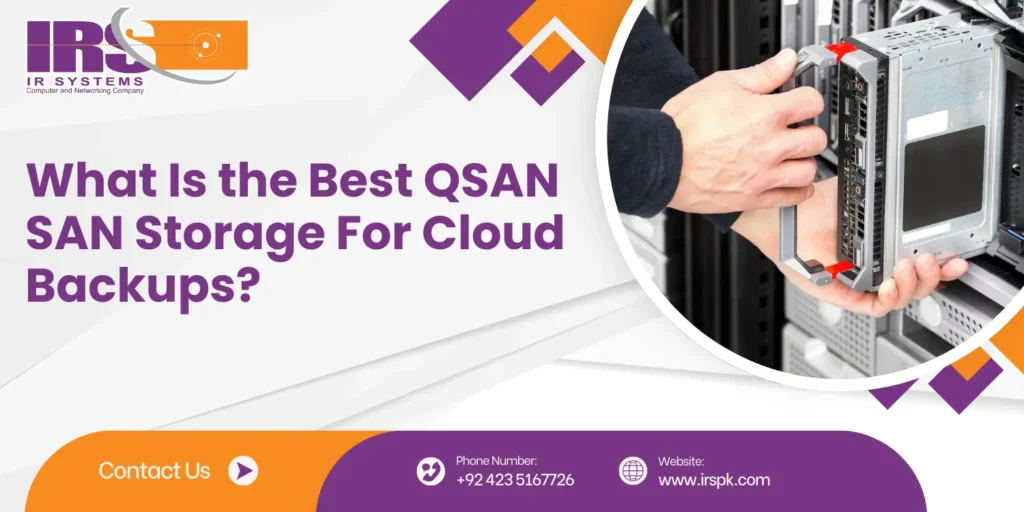
In today’s digital-first world, data is at the heart of every business. Whether you’re a small startup or a growing enterprise, protecting that data with secure, scalable, and high-speed storage is non-negotiable. If your operations rely on cloud backup storage, choosing the right SAN storage system is critical – and that’s where QSAN stands out. At IR Systems, we specialize in building NAS and SAN storage environments that are optimized for performance, data protection, and scalability. In this guide, we’ll explain why QSAN SAN storage is an ideal solution for cloud backups, highlight top-performing models like Qsan XS 5312, Qsan XS 3312, and Qsan XS 3316, and explore how to align your storage infrastructure with your backup strategy. The Importance of SAN Storage in Backup Infrastructure A SAN (Storage Area Network) offers block-level access to data over a high-speed network. This makes it significantly faster and more efficient than traditional external drives or direct-attached storage. When dealing with large datasets or frequent cloud backups, speed, consistency, and uptime are everything – and SAN delivers on all fronts. Why SAN Over Other Storage Types? Block-level storage supports databases, applications, and virtual machines more effectively. Fibre Channel or iSCSI protocols offer high-speed communication. RAID support ensures redundancy and fault tolerance. Easily integrates with backup software and cloud platforms. In short, SAN storage is built for businesses that take their data protection seriously. Where NAS Fits In: A Perfect Complement to SAN While SAN is designed for speed and performance, NAS (Network Attached Storage) is best for file-level access across teams. At IR Systems, we often recommend a hybrid approach that combines QSAN SAN storage with powerful NAS solutions to handle different parts of your business workflow. NAS Storage Benefits: Centralized file access for remote teams Lower cost of entry for basic file sharing Compatible with Windows, macOS, and Linux Excellent for daily backup data storage of documents, media, and reports With the right strategy, your SAN handles mission-critical backups and VMs, while NAS covers collaborative work and light storage. Together, they form a future-ready infrastructure. QSAN: Simplifying Enterprise-Grade Storage QSAN has built a solid reputation for delivering enterprise features without overwhelming complexity or cost. With intuitive interfaces, robust hardware, and reliable firmware, QSAN products are ideal for businesses transitioning to cloud-first environments. Key QSAN Features for Cloud Backups: Snapshot and clone support for point-in-time data recovery Cloud gateway functions for syncing to public clouds (like AWS, Azure) Data deduplication to reduce storage footprint Synchronous and asynchronous replication S.M.A.R.T. monitoring for proactive maintenance Plus, their SAN systems are optimized for integration with backup software like Veeam, Acronis, and Nakivo – which makes deployment faster and easier for your IT team. Detailed Comparison: QSAN SAN Models Ideal for Backups Let’s break down three of the most recommended QSAN SAN models – each suited for different business needs: Qsan XS 5312 – Enterprise SAN Storage at Peak Performance The Qsan XS 5312 is built for businesses that require maximum throughput and always-on availability. It’s ideal for managing large-scale backup data storage or running mission-critical applications on virtual machines. Specs & Highlights: Dual-controller architecture with high availability failover Supports 16Gb Fibre Channel, 10GbE iSCSI, and SAS SSD caching and auto-tiering support for performance tuning Redundant power and cooling systems for uptime 12 x 3.5″/2.5″ bays with expansion options Use Case: Financial institutions, government agencies, healthcare systems – any business with complex data workflows and backup demands. Qsan XS 3312 – Balanced Storage for Mid-Size Businesses The Qsan XS 3312 strikes a perfect balance between performance, affordability, and scalability. It’s an excellent mid-tier SAN solution for businesses looking to centralize backups without overspending. Specs & Highlights: 12-bay chassis with scalable expansion Dual-active controllers with built-in management Supports SSD, SATA, and SAS drives 10GbE support with multi-pathing for faster access Intuitive GUI for simplified backup management Use Case: Digital agencies, law firms, schools, or medium-sized enterprises that need reliable cloud backup storage with high availability. Qsan XS 3316 – Expandable Backup Powerhouse Need more room to grow? The Qsan XS 3316 offers all the benefits of the XS 3312 but with 16 bays instead of 12. This allows more flexibility for growing teams or businesses with heavy backup requirements. Specs & Highlights: 16-bay form factor with seamless scale-out options Compatible with VMware, Citrix, and Hyper-V Built-in data security: snapshot, replication, and WORM support High-speed interfaces for consistent backup performance Use Case: Data centers, media production houses, e-commerce platforms – anyone needing to scale backup operations without system replacement. Real-World Applications of QSAN SAN Storage Let’s take a look at how different industries benefit from QSAN SAN storage: Healthcare: Securely store and back up patient records and imaging files to meet HIPAA compliance. Retail: Centralize transaction logs, product databases, and inventory backups. Education: Keep administrative data, student records, and online learning material safe. Finance: Fast and secure backups for transactional databases and compliance reports. Legal Firms: Archive sensitive documents and ensure safe retrieval with version control. By using SAN storage tailored to these workflows, businesses enjoy faster recovery times, less downtime, and full control over their data lifecycle. Why Partner with IR Systems? At IR Systems, we don’t just sell hardware – we offer end-to-end storage solutions designed around your business. From choosing the right QSAN model to configuring your SAN/NAS network and planning your backup schedule, we’re with you every step of the way. What We Offer: Consultation & Requirement Analysis Custom SAN & NAS Configuration On-site Deployment & RAID Setup Cloud Sync Integration 24/7 Technical Support & Monitoring We’ve worked with companies across Pakistan, helping them secure their digital assets with reliable QSAN SAN storage solutions that scale as they grow. Final Thoughts: Invest in Smart Backup Infrastructure Your business data is too valuable to leave unprotected. By choosing a smart, scalable, and high-performance SAN storage system like those from QSAN, you’re laying the foundation for fast, secure, and efficient cloud backup storage that grows with you. Whether you need the power of the Qsan XS
How SAN Storage Boosts Secure Network Backups
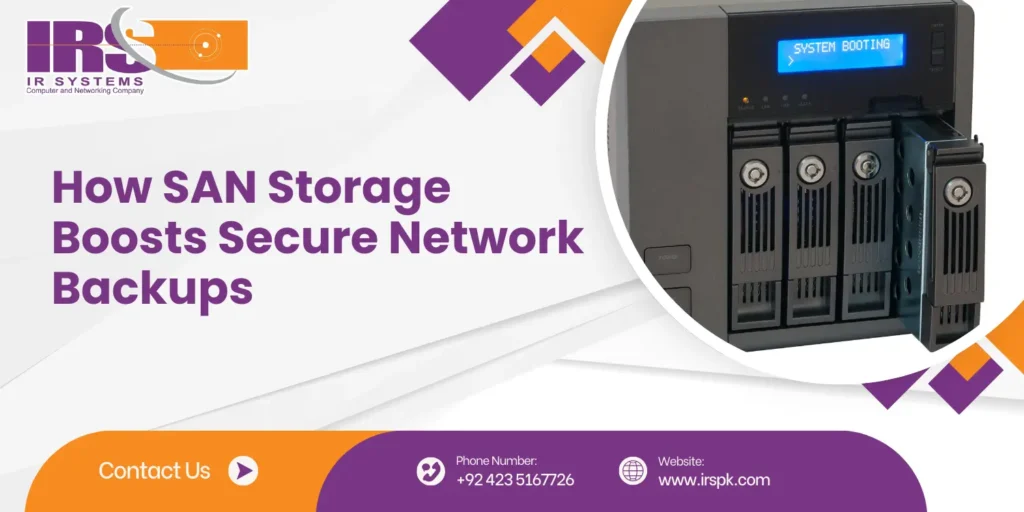
In a world where data fuels every decision and operation, businesses can’t afford to take chances with their backup solutions. Whether you’re running a startup or managing enterprise-level infrastructure, the need for reliable, fast, and secure data backups is undeniable. That’s where SAN Storage steps in as a game-changer. In this blog, we’ll explore how SAN storage not only simplifies backup processes but also enhances network security, performance, and scalability. We’ll also look into how SAN integrates with other storage solutions like Asustor NAS storage systems and supports efficient server cloud backup. Understanding the Basics: What is SAN Storage? SAN stands for Storage Area Network. It is a dedicated high-speed network that connects multiple storage devices to servers, making data available at the block level. Unlike direct-attached storage or basic network-attached storage, SAN storage offers enhanced performance, centralized management, and robust security features. As a key provider in this space, IR Systems specializes in offering tailored SAN storage solutions that empower businesses with dependable and scalable backup options. The Real Value: Why SAN Storage Matters for Backups SAN storage ensures faster, safer, and more reliable backups. It keeps your data centralized, reduces downtime, and gives you full control – making it a smart choice for any secure backup strategy: 1. Enhanced Backup Speeds One of the main challenges in traditional backup systems is the time they take. With SAN storage, data moves through high-speed fiber channels or Ethernet, drastically reducing backup windows. Your business operations won’t have to slow down just because backups are running. 2. Centralized Data Management Managing data across multiple servers can be overwhelming. QSAN centralizes all your storage, allowing you to control backup processes from a single point. This not only saves time but also reduces human errors. 3. Reliable Data Availability With SAN’s redundancy features and high availability, you’re not just backing up your data – you’re ensuring it’s always accessible, even in the face of hardware failures or cyber incidents. Fortifying Backup Security with SAN SAN storage strengthens backup protection by isolating data and preventing unauthorized access, ensuring your critical files stay safe: 1. Isolated Backup Environment SAN storage operates on a separate network, keeping it isolated from the main traffic. This isolation acts as a shield, making it more difficult for cyber attackers to infiltrate backup systems. 2. Advanced Access Controls Many SAN storage area network devices come equipped with role-based access and encryption options. This ensures only authorized users can access or modify backup data, making your backups not just secure but also compliant with data regulations. 3. Faster Disaster Recovery In the event of a disaster, time is critical. SAN storage allows for quick data recovery, helping businesses bounce back faster with minimal losses. Integration with server cloud backup further adds resilience to your disaster recovery strategy. Seamless Integration with Server Cloud Backup Businesses today are increasingly opting for hybrid storage solutions – a mix of on-premise and cloud. SAN storage can work hand-in-hand with server cloud backup, offering both local speed and remote redundancy. Data can be first written to the SAN system for fast access and then mirrored to the cloud for offsite protection. IR Systems offers integration – ready SAN setups that support such dual backup environments effortlessly. How SAN and Asustor NAS Storage Systems Work Together While SAN excels in block-level storage and performance, Asustor NAS storage systems are known for their file-sharing and user-friendly interfaces. Combining the two offers flexibility. Use SAN for performance-critical operations and backups, and NAS for everyday file access and collaboration. This balanced approach ensures data is not only safe but also readily available for your teams. At IR Systems, we help configure systems that blend SAN storage with Asustor NAS devices, creating a powerful and cost-effective storage ecosystem. Designed to Grow: SAN’s Scalability Advantage Every business grows, and so does its data. SAN storage is inherently scalable. You can start with a few terabytes and expand to petabytes without reconfiguring your existing setup. This makes SAN an ideal long-term solution for businesses that are growing or expect to scale their operations. With IR Systems, you get the guidance and hardware support needed to scale your storage efficiently. Why Businesses Trust IR Systems for SAN Storage At IR Systems, we understand that secure data backups are more than just a technical requirement – they’re the backbone of business continuity. Our team specializes in deploying tailored SAN storage solutions that align with your specific needs, whether you’re focused on data protection, disaster recovery, or performance optimization. We not only provide high-performance storage area network devices but also ensure seamless integration with cloud services and NAS systems, offering a complete, secure storage strategy. Final Thoughts: SAN Storage is the Foundation of Secure Backups In an age where data loss can mean financial and reputational damage, having the right storage solution is crucial. SAN storage offers unmatched speed, security, and scalability, making it the preferred choice for modern network backups. By combining SAN with server cloud backup and Asustor NAS storage systems, businesses can build a robust, flexible, and secure data environment. Secure Your Data Today with IR Systems If you’re ready to take your backup strategy to the next level, IR Systems is here to help. Our SAN storage solutions are designed for performance, built for security, and customized for you.Visit IR Systems to get started or contact us today for a free consultation. Let’s build a safer, smarter storage future together.
High-Speed SAN Storage with QSAN Devices

In an era where data is growing exponentially, modern businesses demand efficient, secure, and high-speed storage systems that can keep up with their digital transformation. Enter SAN storage – a technology designed for enterprises that need scalable and performance-driven data solutions. Among the top-tier SAN systems available today, QSAN storage devices have emerged as a preferred choice for businesses seeking high-speed access, advanced performance, and robust backup capabilities. This blog will explore how SAN storage works, the advantages of QSAN devices like the QSAN XS 5312, QSAN XS 3312, and QSAN XS 3316, and why they are the ideal storage solution for high-performance computing, virtual environments, and backup data storage. We’ll also discuss how integrating SAN with cloud backup storage can ensure maximum security and flexibility. Why SAN Storage Is a Game-Changer for Businesses SAN storage is designed to support enterprise environments that require low-latency, high-speed access to data. Unlike NAS (Network Attached Storage) or direct-attached storage, SAN operates at the block level, allowing multiple servers to access shared storage as if it were local. Key advantages include: Centralized storage management Ultra-fast data transfer rates Greater scalability High availability and redundancy Businesses that rely on real-time applications, virtualized workloads, or large-scale analytics benefit immensely from the performance boost SAN provides. The Power of QSAN Storage Devices When performance meets innovation, you get QSAN. QSAN storage is designed for environments that require fast, consistent, and scalable data access. With multiple product lines, QSAN caters to businesses of all sizes. Here’s a closer look at their leading devices: 1. QSAN XS 5312 The XS 5312 is a powerful, dual-controller SAN system offering superior performance. Key features include: 12-bay 2U chassis supporting SSD/HDD combinations Dual-active controller for high availability Up to 25GbE and 32Gb FC support for faster networking Snapshot and cloning for backup data storage This model is perfect for enterprises managing heavy databases, virtualization platforms, or high-transaction environments. 2. QSAN XS 3312 The XS 3312 is a mid-range SAN device with versatile features suitable for medium-sized businesses: 12-bay 2U design with modular expansion Intel Xeon processors for accelerated performance Inline compression and deduplication Built-in support for cloud backup storage For growing businesses, the XS 3312 strikes a balance between affordability and high-performance SAN storage. 3. QSAN XS 3316 The XS 3316 takes things further with more capacity and enhanced data security: 16-bay configuration for larger-scale deployments Advanced RAID support (0, 1, 5, 6, 10, 50, 60) Real-time replication and remote backup options Seamless integration with disaster recovery systems This model is best suited for large enterprises, data centers, and managed service providers. Key Benefits of Using QSAN SAN Storage Ultra-Fast Performance QSAN devices leverage powerful processors, NVMe caching, and advanced networking (25/32GbE), delivering lightning-fast IOPS and throughput. Enterprise-Grade Redundancy Dual controllers, hot-swappable drives, and power supplies ensure that operations continue without disruption—a must for enterprise environments. Efficient Backup Data Storage All QSAN systems include snapshot, clone, and backup features that enable scheduled or on-demand backup data storage and fast data recovery. Scalability Without Downtime Add additional enclosures or drives to QSAN SANs without shutting down operations. Seamless scaling keeps business running 24/7. Integrated Cloud Backup Storage QSAN SAN solutions support hybrid deployments with cloud backup storage, giving businesses the flexibility to protect data offsite while maintaining local performance. SAN Storage Use Cases Across Industries Virtualization & Hyper-Converged Infrastructure (HCI) QSAN SANs provide the speed and bandwidth needed for VMs, virtual desktops, and container workloads. Video Editing and Media Production Creative professionals benefit from high throughput and low latency for 4K/8K media rendering and editing workflows. Healthcare & Finance These sectors require instant access to mission-critical data and compliance with data protection laws. QSAN’s secure SAN storage helps meet those needs. Disaster Recovery Planning QSAN integrates easily with cloud backup storage, replication tools, and DR platforms to protect against data loss. How to Choose the Right QSAN Storage Device When selecting the best SAN storage system for your business, consider: Workload Requirements: Are you dealing with high-performance databases, virtual machines, or large file workloads? Scalability Needs: Choose a system that can grow with your data. Backup Strategy: Ensure the device supports local and cloud backup storage solutions. Budget: QSAN offers a range of devices from entry-level to enterprise-class. For example: QSAN XS 5312 – Best for high-speed enterprise workloads. QSAN XS 3312 – Ideal for mid-sized businesses needing flexibility. QSAN XS 3316 – Tailored for larger organizations with expansive backup needs. QSAN + SAN Storage = Future-Proof IT Infrastructure Combining the advantages of SAN architecture with QSAN’s advanced technology ensures your business remains agile, secure, and competitive. Whether you’re a growing SME or a global enterprise, QSAN’s reliable storage devices offer the performance, redundancy, and versatility to meet today’s challenges and tomorrow’s growth. With features like multi-site replication, real-time snapshots, high-availability architecture, and hybrid cloud backup storage options, QSAN makes SAN storage accessible and effective for any business. Conclusion: Power Your Enterprise with QSAN SAN Storage As data volumes continue to surge, investing in high-speed SAN storage is no longer a luxury—it’s a necessity. QSAN’s XS 5312, XS 3312, and XS 3316 models offer powerful, scalable, and cost-effective solutions that redefine how businesses manage and back up their data. Whether you’re planning a digital transformation, implementing disaster recovery, or just looking to upgrade your existing infrastructure, QSAN delivers performance without compromise. Ready to elevate your storage strategy? Contact us today to explore how QSAN devices like the XS 5312, XS 3312, and XS 3316 can transform the way you manage, protect, and scale your data.
Top SAN Storage & Area Network Devices 2025
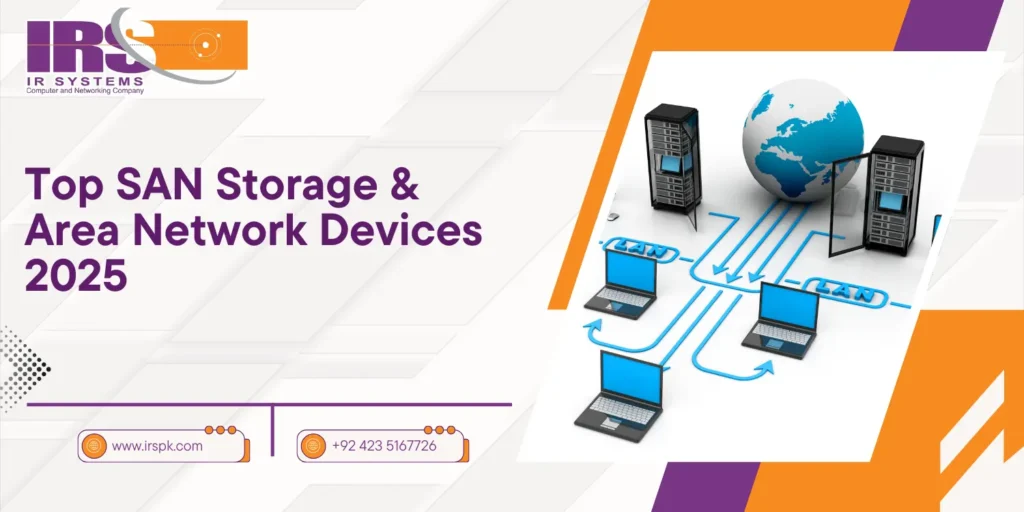
In 2025, businesses are more data-driven than ever before. Every click, transaction, video upload, or software update generates data—terabytes of it. To handle this data explosion, companies are turning to SAN storage. A Storage Area Network (SAN) is a high-speed, dedicated network that provides access to consolidated, block-level storage. It’s built to support enterprise workloads that demand performance, redundancy, and scalability. This blog explores the top storage area network devices shaping the future of enterprise data storage. We’ll discuss leading models, evolving technologies, and how integrating server cloud backup and Asustor NAS storage systems can help your business grow efficiently and securely. What is SAN Storage and Why Does It Matter in 2025? A storage area network (SAN) connects servers to storage systems, ensuring high-speed data access and centralized management. In 2025, SAN is more relevant than ever due to: Increased cloud workloads Remote and hybrid work environments Real-time analytics and AI processing Demand for faster disaster recovery Businesses need solutions that are secure, scalable, and agile. SAN storage delivers on all fronts. Benefits of Modern SAN Storage Systems Modern SAN solutions come with a range of features that traditional systems simply can’t compete with: Ultra-fast data transfers for high-performance applications Advanced redundancy and backup to prevent data loss Centralized control of vast data pools Future-proof scalability that grows with your needs Top SAN Storage Devices to Watch in 2025 Below are some of the most powerful SAN storage devices making waves in 2025: 1. QSAN XCubeSAN XS5326 A powerhouse for enterprises, the QSAN XS5326 combines dual controllers, 25GbE connectivity, and lightning-fast performance for mission-critical environments. Key Highlights: Supports over 5PB of raw capacity Advanced virtualization support Redundant components for zero downtime 2. Infortrend EonStor GS 4024U Infortrend continues to impress with hybrid SAN/NAS solutions. The GS 4024U offers exceptional scalability and cross-platform flexibility. Best For: Media production Government and healthcare Cloud sync and backup 3. Dell PowerStore 500T Dell’s entry-level model in 2025 is ideal for mid-sized businesses needing high throughput and flexible scaling. Features Include: NVMe and SSD hybrid architecture Machine learning optimization Unified SAN/NAS integration 4. NetApp AFF A250 A robust SAN storage option optimized for AI, analytics, and high-performance computing. Performance Specs: Latency under 1ms Inline deduplication & compression Integrated cloud tiering 5. Hewlett Packard Enterprise (HPE) Alletra 5000 HPE’s Alletra series is now a leader in hybrid storage. The 5000 model excels in mixed workloads and remote backup. Top Capabilities: Built-in data services Automated workload balancing Multi-cloud integration The Role of Asustor NAS Storage Systems in SAN Networks While Asustor NAS storage systems are primarily NAS devices, many are now SAN-compatible through iSCSI protocols. In 2025, their flexibility, cost-effectiveness, and simplicity make them a key part of hybrid storage architectures. Use Asustor NAS for: Small office backups Remote team collaboration Secure file storage with cloud sync Popular model: Asustor Lockerstor 10 Pro AS7110T Server Cloud Backup: An Essential SAN Companion Data backups are no longer optional. Server cloud backup systems ensure business continuity by keeping redundant copies off-site. Integrated with SAN systems, this adds a powerful layer of protection. Benefits: Off-site disaster recovery Continuous data replication Ransomware-resistant snapshots How to Choose the Right SAN Storage Solution Choosing the right storage area network device depends on: Data Volume: More users or data = higher capacity needed Performance Needs: SSD vs HDD, RAID configurations, caching Budget: Entry-level to enterprise-class solutions Backup Integration: Cloud and on-prem compatibility Always align your SAN choice with business growth forecasts. SAN Storage vs Traditional Storage – A Quick Look Feature SAN Storage Traditional Storage Performance High-speed Moderate Scalability Easy to scale Limited Management Centralized Scattered Cost Higher upfront Lower upfront Ideal Use Enterprise/data-heavy apps Small workloads Key Industries Benefiting from SAN in 2025 Healthcare: EMRs, imaging, patient data Finance: Real-time trading, encrypted data Education: Remote learning platforms Entertainment: 4K/8K content editing & streaming E-commerce: Customer data & transaction processing Best Practices for SAN Storage Deployment Segment your storage network for security Enable encryption and role-based access Use automated monitoring tools Regularly test disaster recovery plans Invest in tech support and maintenance The Future of Storage Area Network Devices By 2030, we expect SAN systems to integrate even deeper with AI, edge computing, and fully automated data centers. Quantum storage might enter the scene—but for now, the focus is on: AI-powered workload balancing Self-healing architectures Cloud-native SAN frameworks Conclusion SAN storage in 2025 is not just a tool—it’s the foundation of a resilient, future-ready business. As data becomes more integral to success, investing in high-performance storage area network devices ensures your infrastructure is ready for anything. Whether you’re managing an SMB or a large enterprise, SAN solutions—especially when combined with server cloud backup and Asustor NAS storage systems—offer unparalleled reliability, scalability, and control. Choose wisely, stay secure, and scale smart. If you need expert guidance on choosing the right solution, don’t hesitate to contact us. FAQs What is the difference between SAN and NAS in 2025? SAN provides block-level storage and is ideal for performance-critical tasks. NAS uses file-level storage, better for shared file access. Are Asustor NAS devices suitable for SAN environments? Yes, via iSCSI configuration, Asustor NAS devices can integrate with SAN setups for hybrid storage flexibility. How does server cloud backup enhance SAN storage? It adds disaster recovery, protects from ransomware, and allows off-site data access in case of on-prem failure. What industries benefit most from SAN storage? Finance, healthcare, media production, and e-commerce rely heavily on SAN for real-time data access and security. 5. Is SAN storage expensive to implement? Initial setup costs can be higher, but scalability, performance, and reliability offer long-term ROI.
Maximize Efficiency with SAN Storage Solutions
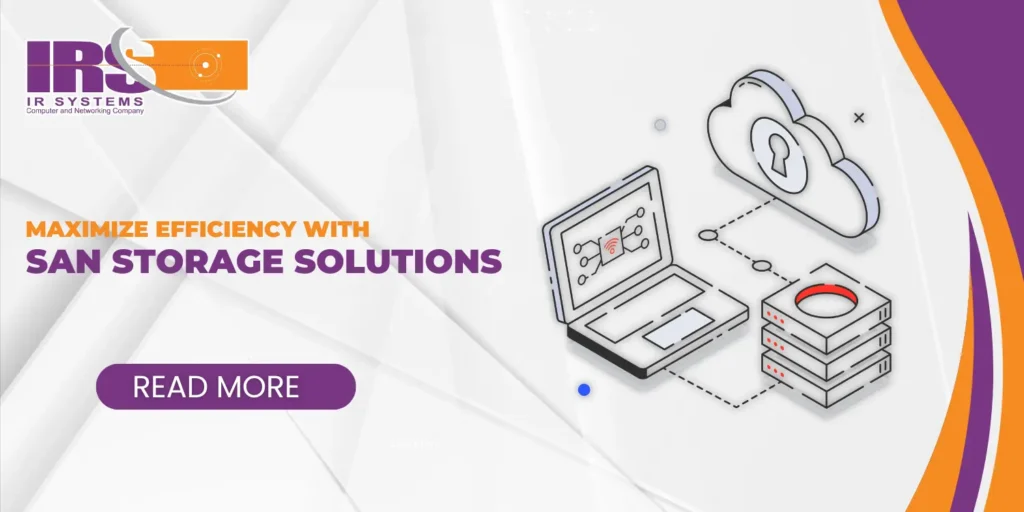
In today’s fast-paced digital world, managing data efficiently is a top priority for businesses of all sizes. Whether you are running a small enterprise or a large corporation, having a reliable and high-performance data storage solution is crucial. This is where SAN storage (Storage Area Network) comes into play, offering businesses a scalable, secure, and efficient way to store and manage their critical data. Unlike traditional storage solutions, a storage area network provides dedicated storage access to multiple servers, ensuring high availability and faster data retrieval. In this blog, we will explore the benefits of SAN storage, how it differs from other storage solutions, and why businesses should invest in storage area network devices for seamless operations. What is SAN Storage? SAN storage is a high-speed network that connects multiple storage devices to servers. Unlike direct-attached storage (DAS) or network-attached storage (NAS), a storage area network is designed to provide block-level storage, which improves performance and efficiency. It acts as a centralized storage system, ensuring that all connected devices can access data quickly and securely. Key Features of Storage Area Network (SAN) High-Speed Data Access: SAN storage provides ultra-fast data transfer rates, making it ideal for businesses with high-performance computing needs. Scalability: Businesses can easily expand their storage area network by adding more storage devices as needed. Data Redundancy & Backup: Many SAN storage solutions offer built-in redundancy, ensuring data is protected against failures. Centralized Storage Management: A storage area network simplifies data management by providing a single, consolidated storage platform. Enhanced Security: With advanced encryption and access control mechanisms, SAN storage ensures sensitive data remains protected. SAN Storage vs. Other Storage Solutions Many businesses debate between SAN storage, NAS (Network Attached Storage), and cloud-based storage. While each has its own advantages, storage area networks are particularly beneficial for enterprises requiring high-speed and highly available storage. Feature SAN Storage NAS Cloud Storage Performance High-speed data transfer Moderate Dependent on internet speed Scalability Highly scalable Limited Scalable but subscription-based Security Advanced encryption & access controls Basic security features Security depends on provider Accessibility Block-level access File-level access Anywhere with internet Cost Efficiency High initial cost, long-term savings Lower upfront cost Recurring subscription costs Benefits of Storage Area Network Devices for Businesses Improved Performance for Enterprise Applications Businesses running resource-intensive applications such as databases, ERP systems, and virtual environments benefit from SAN storage due to its low latency and high-speed connectivity. Reliable Server Cloud Backup Solutions Many companies integrate SAN storage with server cloud backup to ensure disaster recovery and business continuity. Seamless Data Management Unlike local storage, where data is fragmented across multiple devices, storage area networks provide centralized management, making it easier to control and maintain data. Enhanced Business Continuity & Disaster Recovery SAN storage solutions often come with redundancy features such as RAID configurations and automated failover mechanisms, ensuring businesses remain operational even in the event of hardware failures. How to Choose the Right SAN Storage Solution Selecting the best storage area network depends on several factors, including business size, budget, and performance requirements. Here are key considerations when investing in storage area network devices: Storage Capacity: Determine how much storage space your business currently needs and consider future growth. Connectivity & Speed: Ensure the SAN storage solution supports high-speed connectivity such as Fibre Channel or iSCSI for seamless data access. Scalability: Look for solutions that allow easy expansion without disrupting business operations. Redundancy & Backup: Opt for storage area network devices that provide built-in redundancy, failover support, and server cloud backup options. Security Features: Prioritize encryption, multi-factor authentication, and role-based access controls to protect critical business data. Future Trends in SAN Storage As technology evolves, SAN storage solutions are also advancing. Here are some key trends shaping the future of storage area networks: Integration with Cloud Storage: Many businesses are adopting a hybrid approach, combining SAN storage with server cloud backup to enhance flexibility and data availability. AI-Driven Storage Management: Artificial Intelligence (AI) and machine learning are being integrated into storage area network devices to optimize performance and automate data management tasks. NVMe Over Fabric (NVMe-oF): This next-generation technology enhances data transfer speeds within SAN storage, reducing latency and improving overall efficiency. 5G & Edge Computing Integration: The rise of 5G technology will enable businesses to leverage storage area networks for real-time data processing and analytics. Enhanced Data Security Protocols: With increasing cyber threats, SAN storage providers are implementing more robust encryption and authentication mechanisms to safeguard sensitive data. Conclusion: Investing in SAN storage is a strategic decision that enhances data management, improves operational efficiency, and ensures business continuity. Whether you run a small business or a large enterprise, deploying a storage area network provides long-term benefits, including high-speed data access, scalability, and enhanced security. By integrating storage area network devices with server cloud backup, businesses can achieve a reliable, secure, and efficient storage infrastructure. As technology continues to evolve, staying ahead with advanced SAN storage solutions will give your business a competitive edge in managing data effectively. Looking for the best SAN storage solutions for your business? Contact us today to explore industry-leading options and ensure your data remains secure and accessible at all times.
What Are the Advantages of SAN Over NAS?
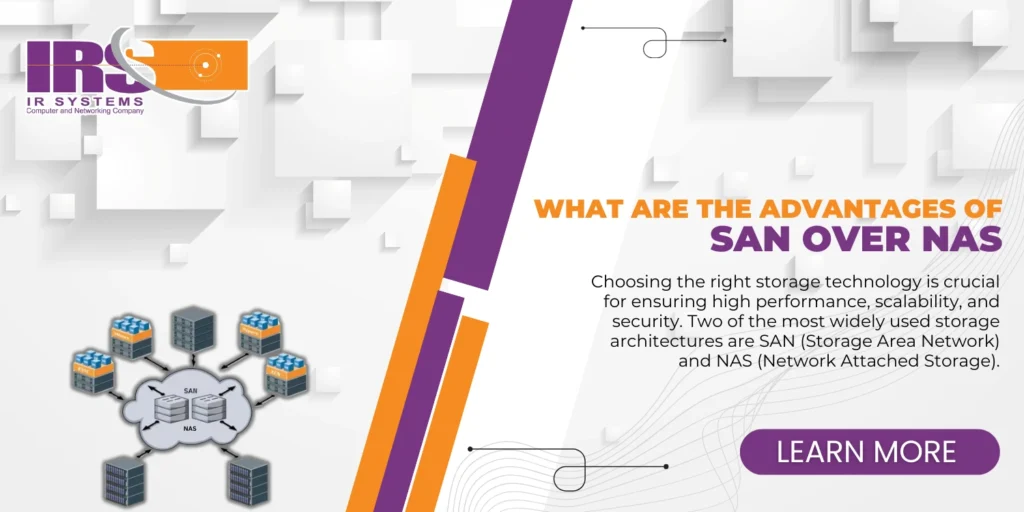
In today’s digital landscape, businesses generate vast amounts of data that require efficient and secure storage solutions. Choosing the right storage technology is crucial for ensuring high performance, scalability, and security. Two of the most widely used storage architectures are SAN (Storage Area Network) and NAS (Network Attached Storage). While both serve essential roles, SAN storage stands out as the preferred choice for enterprises and data-intensive applications. This article explores the advantages of SAN over NAS, highlighting why businesses, especially those looking for backup solutions in Lahore, should consider SAN for backup data storage and high-speed performance. Understanding SAN and NAS: Key Differences Before discussing the advantages of SAN storage, it is important to understand the fundamental differences between SAN and NAS. What Is SAN (Storage Area Network)? A Storage Area Network (SAN) is a dedicated high-speed network that connects storage devices directly to multiple servers, enabling block-level data access. Unlike traditional storage methods, SAN ensures low latency, high reliability, and superior performance by keeping storage traffic separate from standard network operations. Best For: Large enterprises, cloud computing, virtualization, databases, and applications requiring high-speed performance. Common Uses: Financial transactions, healthcare records, e-commerce platforms, and large-scale backup data storage solutions. What Is NAS (Network Attached Storage)? Network Attached Storage (NAS) is a file-based storage system connected to a shared network, allowing multiple users to access files over Ethernet. NAS functions like a centralized file server, making it ideal for simple file sharing and backups. Best For: Small businesses, home users, and organizations needing shared file access. Common Uses: Office document storage, media streaming, and small-scale backup solutions in Lahore. Why Choose SAN Over NAS? Key Advantages of SAN Storage 1. High-Speed Performance and Low Latency SAN storage provides exceptional performance compared to NAS, thanks to its high-speed architecture and block-level access. How SAN Achieves High Performance: Uses Fibre Channel (FC) or iSCSI for ultra-fast data transfers. Bypasses traditional network congestion, ensuring seamless operations. Delivers direct storage access to applications, reducing delays. Why This Matters: Businesses handling big data analytics, real-time transactions, and database management need high-speed access to critical information. SAN storage ensures minimal downtime and maximum efficiency. For example, financial institutions processing thousands of transactions per second cannot afford slow storage speeds. SAN ensures rapid data access, preventing transaction delays. 2. Seamless Scalability Without Performance Bottlenecks As businesses grow, their storage needs increase. SAN storage offers seamless expansion without affecting speed or efficiency. NAS Scalability Limitation: Adding more users or storage can slow down NAS performance due to increased network traffic. SAN Advantage: Easily expandable by integrating additional storage units. Supports thousands of users and massive data volumes without slowdowns. Best suited for organizations requiring continuous data access and storage expansion. 3. Superior Backup and Disaster Recovery Solutions Data loss can be devastating for businesses. SAN storage provides highly efficient backup and disaster recovery solutions to ensure business continuity. Advanced Backup Data Storage Features: Block-level backup enables faster and more efficient data recovery than NAS file-based backups. Snapshot technology allows quick restoration of previous data states. SAN supports real-time replication, ensuring up-to-date backup copies. Disaster Recovery Benefits: Geographically distributed replication ensures data availability in case of system failure. Ideal for backup solutions in Lahore, offering businesses a secure way to store and restore critical information. A large IT firm in Lahore, for example, can prevent data loss by using SAN for continuous replication and high-speed recovery, ensuring minimal downtime during unexpected failures. 4. Dedicated Storage Network for Maximum Efficiency Unlike NAS, which relies on a shared network, SAN operates on a separate high-speed network, ensuring better performance and reliability. Advantages of a Dedicated Storage Network: Eliminates network congestion and prevents slow data access. Provides uninterrupted storage access, even during peak usage hours. Reduces dependence on traditional Ethernet networks, enhancing efficiency. For example, an e-commerce company experiencing high traffic during a sale will benefit from SAN storage because it prevents slowdowns and ensures a seamless customer experience. 5. Enhanced Security and Data Protection Data security is a top priority for businesses handling sensitive information. SAN storage offers advanced security features that reduce the risk of unauthorized access or data breaches. Key Security Benefits of SAN Storage: Encryption capabilities protect data from cyber threats. Role-based access control (RBAC) restricts data access to authorized users only. Built-in redundancy ensures data integrity in case of hardware failures. Industries such as banking, government, and healthcare benefit from SAN security features, ensuring that sensitive data remains protected against cyberattacks and unauthorized access. 6. High Availability and Reliability Downtime can result in significant financial losses for businesses. SAN storage is designed to minimize downtime and ensure maximum reliability. Built-in Redundancy Features: Multiple storage controllers to prevent single points of failure. Automated failover mechanisms to ensure continuous operations. RAID configurations to protect against data loss due to drive failures. Many SAN solutions guarantee 99.999% uptime, making them ideal for mission-critical applications that require constant data access. 7. Optimized for Virtualization and Cloud Environments With the rise of virtualization and cloud computing, businesses need efficient storage solutions that can support multiple virtual machines. Why SAN is Best for Virtualization: Provides high-speed data access for virtual servers. Supports live migration of virtual machines without data transfer delays. Improves overall efficiency in cloud and hybrid environments. For organizations running VMware, Hyper-V, or Kubernetes, SAN storage ensures a smooth and scalable virtualization infrastructure. When Should You Choose SAN Over NAS? SAN storage is the best choice if your business requires: High-speed performance for databases, analytics, and enterprise applications. Scalable storage solutions without impacting speed. Secure backup solutions in Lahore for business continuity. Reliable backup data storage with advanced security features. High availability for mission-critical applications. Seamless virtualization support for cloud-based environments. If your organization deals with large-scale data storage, virtualization, or enterprise workloads, SAN storage is the ideal solution. Final Thoughts While NAS is useful for small businesses and basic file-sharing needs, SAN storage provides unmatched performance, security, scalability, and reliability, making it the preferred choice for enterprises. For businesses in
Boost Business with SAN Storage & Backup
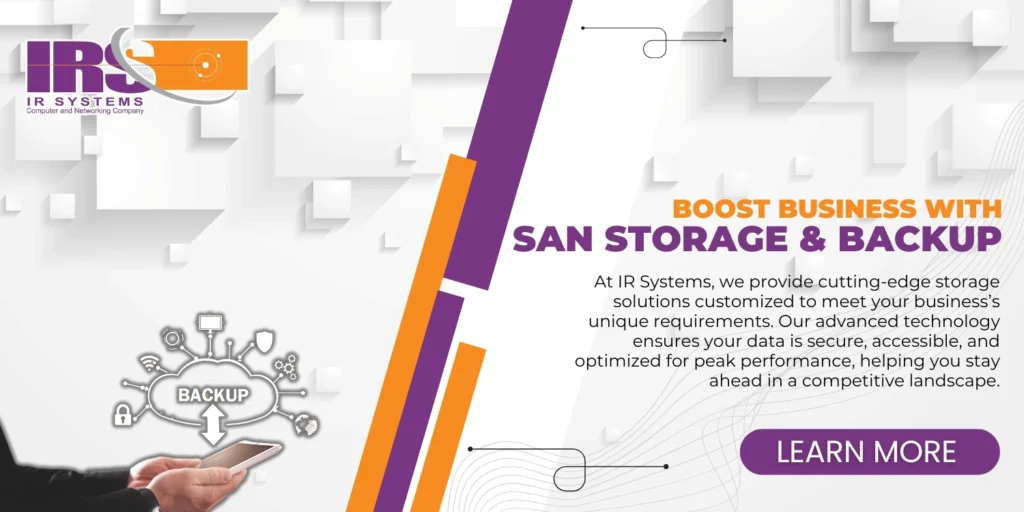
In today’s fast-paced digital era, businesses are constantly managing and processing massive volumes of data daily. Efficient data storage and robust security are essential to keep operations running smoothly and prevent costly downtime. Storage Area Network (SAN) storage is a high-performance solution designed to help enterprises manage, store, and protect their data effectively. At IR Systems, we provide cutting-edge storage solutions customized to meet your business’s unique requirements. Our advanced technology ensures your data is secure, accessible, and optimized for peak performance, helping you stay ahead in a competitive landscape. Trust us to deliver reliable, scalable storage solutions that empower your business to thrive. What is a Storage Area Network (SAN), and Why Should It Be Used? Storage Area Network (SAN) storage is a high-speed, dedicated network that provides access to consolidated block-level storage. Unlike traditional storage methods, SAN enhances data availability, reliability, and performance for businesses. Key benefits include: High-Speed Performance – Ensures quick data access and reduces latency. Scalability – Allows businesses to expand storage capacity as needed. Data Redundancy – Offers failover protection and disaster recovery. Enhanced Security – Ensures restricted access and data protection. Improved Efficiency – Reduces bottlenecks and enhances overall system performance. With these features, SAN storage is the preferred choice for businesses looking to optimize their IT infrastructure and enhance data security. The Essential Guide to Enterprise Data Security and Continuous Business Growth Data security is at the core of modern business operations. Without secure data storage, organizations risk data breaches, compliance issues, and financial losses. SAN storage plays a vital role in enterprise security by: Providing Data Encryption – Protects sensitive information from unauthorized access. Offering Redundancy & Backups – Prevents data loss through replication and failover mechanisms. Enabling Quick Data Recovery – Minimizes downtime in case of failures. Supporting Secure Remote Access – Ensures authorized personnel can access critical data from anywhere. Enhancing Disaster Recovery Strategies – Provides seamless recovery options for business continuity. By implementing a reliable backup solution, businesses can safeguard their operations and ensure continuous growth without disruptions. Backup Solutions: Ensuring Data Protection and Business Continuity A well-structured backup solution is critical for businesses relying on data-driven operations. Key components of effective backup solutions include: Automated Backups – Schedule regular backups to prevent data loss. Cloud Integration – Store backup copies offsite for additional security. Disaster Recovery Plans – Ensure data retrieval in case of system failures. Scalable Storage – Adapt to business growth without compromising security. Data Replication & Mirroring – Enhance data availability and redundancy. Investing in backup solutions ensures that businesses remain resilient against cyber threats and unexpected system failures. Understanding Variations in SAN Storage Systems When choosing a Storage Area Network solution, understanding its variations is essential. Businesses can opt for: Fibre Channel (FC) SAN – High-speed, low-latency storage connectivity ideal for large enterprises. iSCSI SAN – Cost-effective and suitable for small to mid-sized businesses. NVMe-oF SAN – Ultra-fast data transfer with minimal latency for high-performance applications. Hybrid SAN Solutions – Combining multiple technologies for customized storage needs. Each variation offers specific advantages, helping businesses select a storage solution that aligns with their operational requirements and budget. Exploring Qsan Storage for Business Efficiency Qsan Storage is an industry-leading Storage Area Network solution known for: Performance Optimization – Enhancing storage speed and efficiency. Robust Security – Offering advanced data protection features. Scalability – Growing with business demands without disruption. Cost-Effectiveness – Providing enterprise-grade features at a competitive price. Intelligent Data Management – Simplifying data handling through automated tools. Businesses looking for a high-performance storage solution can rely on Qsan Storage for secure and efficient data management. Why Choose IR Systems for Your SAN Storage Needs? At IR Systems, we provide cutting-edge Storage Area Network solutions designed to meet enterprise demands. Our solutions ensure: Seamless Integration – Compatible with existing IT infrastructure. Customizable Storage Options – Tailored to business-specific requirements. Reliable Backup Solutions – Ensuring data protection and quick recovery. Expert Consultation & Support – Providing ongoing technical assistance and training. Scalable & Future-Proof Solutions – Designed to grow alongside your business. Visit IR Systems today to explore our offerings and find the perfect storage solution for your business. FAQs on SAN Storage & Backup Solutions What is the main advantage of SAN storage? SAN storage provides high-speed, scalable, and secure data storage, ensuring efficient business operations. How does SAN storage differ from NAS storage? SAN operates at the block level for fast performance, while NAS storage works at the file level for easier data sharing. Are backup solutions necessary for SAN storage? Yes, implementing backup solutions ensures data protection and quick recovery in case of system failures. What industries benefit the most from SAN storage? Industries such as finance, healthcare, IT services, and manufacturing rely on SAN storage for secure, high-speed data management. How can IR Systems help with SAN storage? At IR Systems, we offer customized Storage Area Network solutions and data recovery plans to enhance business efficiency and security. Conclusion Ensuring secure and efficient data management is essential for business growth. SAN storage offers high-speed performance, scalability, and robust security, making it a vital solution for enterprises. At IR Systems, we provide tailored backup solutions and flexible storage options to safeguard your critical data and enhance operational efficiency. Our expert team helps businesses integrate reliable storage systems that prevent data loss and downtime. Whether you need enterprise data security or seamless expansion, we have the right solution for you. Contact Us today and discover how our advanced storage solutions can support your business success!
